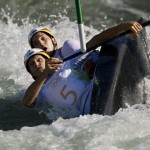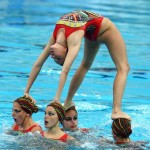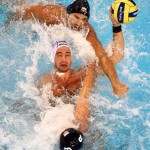Archive for the ‘Philosophy’ tag
Planetwater on the Map
Planetwater.org appears on Andreas Roth’s map that shows the locations of where a given blog is based at.
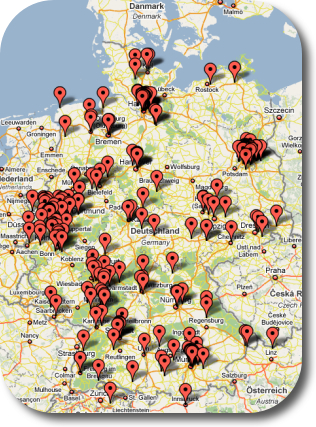
Map of Blogs in the area of Germany.
Great idea for a goole.maps mashup!
German Water Bottle – What’s Going on?
Yesterday, my girlfriend bought a water bottle. When I saw the back, my immediate reaction was a positive surprise, because what I saw, seemed to be a hydrogeologic cross-section. And that can’t be a bad thing, right?
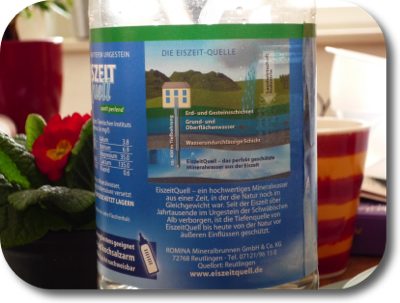
Label of a German Water Bottle
Unfortunately, some thoughts came to my mind which don’t add up everywhere… Let’s look a little closer at that label:
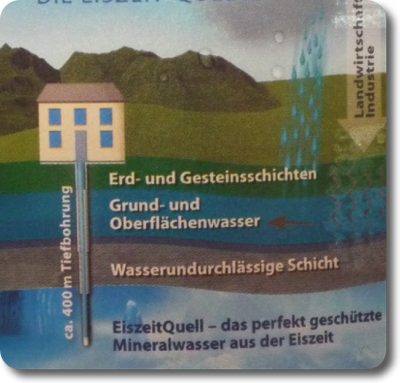
Enlarged Label of a German Water Bottle
- The first layer, indicated in green, is labeled “earth- and rock- layers” — does the green indicate that in these layers are living plants? Why does the text indicate that there are multiple layers, and the picture shows only one green layer?
- The second layer is called “ground- and surface water”. Why should they be mixed? And why is the surface water below the ground surface under earth- and rock- layers? It is shaded in blue, I guess indicating the presence of water. What does the arrow in that layer imply? Why is there a relatively thin, darker blue layer?
- The next layer down in the sequence is shaded in grey and labeled “water impermeable layer”. So this layer is a steel plate?
- The bottom most layer is labeled “Ice-ageSpring – the perfectly protected mineral water from the ice-age”. This layer is indicated by a really nice variable shading in blue in white resembling a glacier. Does that mean there’s a glacier down there? Why is that layer perfectly protected? By the water-impermeable layer on top? Does it mean that layer is also impermeable for contaminants? The arrow on top, pointing vertically towards ground surface indicates input from “agriculture and industry” — where does that input go? “Just” into ground- and surface water?
- The boundaries of all the layers are parallel, and all except the bottom most layers have constant thickness everywhere.
All these questions in my mind, I thought I’d strive for clarification, and have a look at the webpage that the label indicates. This is what I found under the section “expert opinion“:
„EiszeitQuell weist nur alte, gereifte Grundwasserkomponenten auf. Das eiszeitliche Mineralwasservorkommen wird gegen Umwelteinflüsse in idealer Weise abgeschirmt. Die ausgewogene Zusammensetzung der Inhaltsstoffe und das Fehlen von anthropogen bedingten, vom Menschen verursachten Stoffen wie Nitrat oder Nitrit bewirken unter anderem seine in zahlreichen Untersuchungen nachgewiesene ursprüngliche Reinheit. Es ist natriumarm und für die Zubereitung von Säuglingsnahrung geeignet.“
If you don’t understand German, and even if you put this only into the google translating service, you will notice, that they talk about this water as if it was the main course in a five star restaurant!
What was the company thinking? Is there anything we could do?
The Olympics are over. What remains?
The Olympics are over. They are still, despite the doping problems, an awesome sports events. I did not get the chance to watch much due to the time difference between China and Germany. But I do have one favorite moment: the team table-tennis semi-finals between Germany and Japan. Such a close game, and so brilliant sports. Pictures connect and I just found this blog by the gang of Newsweek photo-journalists, some exceptional photographers, who covered the Olympics for their magazine. Shown below are some images related to water from those guys blog.
One of these Newsweek photographers, Donald Miralle, writes about one such cool moment, the 100m mens’ final. He describes how such moments remain cool moments, but the main characters fade away very soon:
[…] Peter Reid Miller of Sports Illustrated posed the question to me tonight before the start of the finals, “Do you even remember who won the 100 in Athens?” I was there, I shot it, I remember taking an OK frame of it, but for the life of me I couldn’t remember who won [It was Justin Gatlin of the U.S.–ED]. And you know why, after tonight NOBODY CARES. The athlete, whether it’s one of the Jamaicans or the American, will be on the front cover of every newspaper and Website for the next 24 hours. You won’t see them again in the headlines for another four years. Unless, that is, one of them tests positive for doping…
Besides sports, the Olympic games put the focus on China. Here in Germany, every day there was some report on something in China. This is, I think, how this relates to planetwater: So many people live in China, and there are so many environment-related problems. Some problems were created specifically because of the Olympics — the water for the white water canal had to come from somewhere, whereas everything in this area usually is rather dry. So these are some environmental problems related to the Olympics I am aware of:
Environment
- water problems — this is only one example of many. And we will not talk about the Three Gorges Damn now.
- air quality problems do exist (see also here) in Peking, for the Olympics cars were taken from the road (Spiegel a and b), and factories were shut down
- there were health concerns before the start of the Olympics, I haven’t heard, seen, or read any about this after the start of the Olympics
- there were big problems with algae in the water where the sailing and rowing events took place. The algae were removed by manual labour. These problems did not seem to exist during the Olympics
For the course of the Olympics, it seemed like those problems were handled (maybe not exactly solved) fairly well. But what about now? Factories can not be shut down for ever. And I would guess that the cars will push onto the streets again fairly soon. And the eye of the international media will not be there anymore, not to the extent as during the Olympics anyways. The human rights issues that exist in China were not ignored in “Olympic TV coverage”, and human rights are the basis for any human being:
Human Rights
- two old women were sentenced to re-education camp after they tried to protest for not receiving sufficient compensation when their homes were seized for redevelopment. This story was picked up in Germany by the ZDF, and had prominent air time during two news broadcasts.
- before the start of the Olympics people were given the right to speak out their opinions if they apply to do so. After the start of the Olympics it became clear that nobody was granted that right
Some people claim there is a set-back regarding human rights in China due to the Olympics. Who will report, not to speak of control, when the majority of the media is gone and TV time-slots are back to normal and away from China? And what will happen with and in Tibet? Nobody has talked about all those protests when the Olympic fire was in San Francisco and other places. What will happen to the people that wanted to demonstrate during the Olympics? Let’s hope things don’t get worse after the Olympics than they were before. How should human beings care for the environment or clean up environmental pollution, if their individual rights are not existent? I found this picture that captures the point of authors cited in this post here. Along the same lines follows the quote below by Sharon Hom, Executive Director of HRIC.
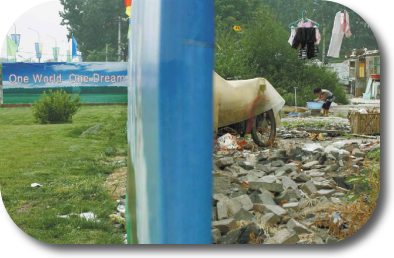
Every coin has two sides.
The carefully orchestrated facade could not conceal a police state that tramples on human rights.
Painting a Picture of the “Era of Peak Water”
Wired has a great article on the “era of peak water”. The author, Matthew Power, makes an argument for the need of more and better data:
One barrier to better management of water resources is simply lack of data — where the water is, where it’s going, how much is being used and for what purposes, how much might be saved by doing things differently. In this way, the water problem is largely an information problem. The information we can assemble has a huge bearing on how we cope with a world at peak water.
The article investigates the problem of water scarcity by looking at three case studies:
Chandler, Arizona, in the US South-West dessert, where Intel currently has three chip plants running. And chip plants need a lot and very clean water. Of course, Intel will always have more money than the average water needing person.
London, UK, where Thames Water, a private water-supply company, needs to deal with old and leaking pipe networks
Australia, “the most arid continent after Antarctica”, where droughts have catastrophic effect on rice farming. Of course you might ask, why try to grow rice in an arid region?
On top of agriculture, industry, and human needs, all of which grow on a global scale, the impacts of climate changing towards more extreme conditions effects the water supply at all those three sites negatively and severely.
Thoughts from Erich Fromm Price Ceremony
On thursday Jakob von Uexküll was awarded the Georg Fromm Preis 2008. The ceremonies, including a speech given by Uexküll took place in Stuttgart, and I had the opportunity to take part. Last year the price was awarded to Eugen Drewermann and Konstantin Wecker, which was very inspiring, so I was looking forward to the ceremony this year. You will hopefully see after you’re done reading that there is a link to planetwater!
It seems to me that Uexküll did two important things in his life:
- Initiated the World Future Council, an illustrious group of people with the goal to leave the planet earth at least in a state comparable to the state they found the planet in.
- Initiated the “Right Livelihood Foundation†who awards the “Right Livelihood Awardâ€. This award is thought to be not a replacement of the Nobel Price, but an addition. People who advance human kind but can not be awarded a Nobel Price, because they work for example in not-traditional medicine (because they are member of a first nation), or in a field that is not recognized with a Nobel Price (ecology, f.ex). Uexküll mentioned that it is important to him that now a member of the Nobel family now talks at the award ceremony for the Right Livelihood Award.
Inspiring people:
Uexküll accomplished neither of the two things because of traits he learned at a school or at an university. But he had enough charisma, nuts, stamina, and he could convince enough people of the importance of these two organizations, so that he realized them. This fact alone is fascinating.
He is not a scientist by trait, but he deals a lot with science, recently with the science of global and climate change. Not so much because he is interested in the underlying processes of climate change, but because he sees that things are changing, and lead to a negative impact and hence he is alert and want to change things, so that future generations do not have to suffer because of his actions.
Things Can Change Quickly
Uexküll explained by example how quickly the climate changes. One of the first recipients of the Right Livelihood Award in the early 1980s was a member of a first nation in Australia who described how species that inhabited his homeland changed due to changing climate, and how he experiences that on a daily basis. Uexküll pointed out that back then nobody cared too much about this, and especially nobody really saw the global aspect of this problem. He also gave other examples for how quickly things can change: – It was a matter of a few months only after which the “iron curtain†broke down. Some people couldn’t adapt fast enough, and their leaders were no leaders anymore within a few days. – Environmental Change: There is evidence that icebergs melt way faster than we think.
The issue that anything can move forward into any direction after a certain threshold is exceeded is described in great fascinating detail in a book by Malcom Gladwell entitled “The Tipping Point“.
Society needs to change
The bigger picture is, that society needs to change in order for climate change not to occur in a destructive way. Uexküll has a rather philosophical approach to ideas how society can change. For me as an engineer this seems like a very interesting approach — I would rather look into technologies that can improve things.
According to Uexküll there are two main philosophical and ethical problems. One is that more consumption is not a good strategy: A city in Sweden decided that there should be no advertisement in public transport. And, another major city in the world, Sao Paolo, decided last fall that public advertisement is a form of pollution. For me, this seems dramatic! It goes back to Erich Fromm, his view on the importance on media, and how he described in his view of the 1950s general public in the US, that they take-in media, that any person, with the slightest degree of thought in it, would not be willing to accept. And where are we today… Anyways. The second problem is that there is a major rift between the values that our society still has and the way of life of most of society, especially western society.
Why is the general public not (yet) willing to change things dramatically? There is no more doubt in the scientific community that the climate is changing. How do you get society to change? Scientific proof obviously is not enough. Tradition very obviously is not enough, because in the last few generations so many things changed, and not in an environmentally friendly way. Religion… well, Religion has been a driver for societal change in the past. The Vatican has recently created a new sin, environmental pollution, but is that going to change anything? The Media? Is is a fact that US newspapers publish about 1/3 the amount of European newspapers on environmental issues in the broadest sense. So how is this going to change? How is any media that lives on the number of viewers or papers sold going to change a society towards a better and more environmentally friendly way? Politics? There are some good paths being walked along, some laws implemented in Germany for supporting energy efficiency in houses is one example. There are also bad examples, for example the endless discussion in Germany if we really should shut down atomic energy power plants after we had decided to do so… Markets? This is rather interesting too, and I’m not an economist. My feeling and observation in Germany over the last year or so is, that the less oil there is, the more expensive it gets. At least it seems as if oil is getting scarce… as a geologist I’m sure there’s more places that we could mine for more oil… right now a huge part of Alberta, Canada is being destroyed for that, and it seems as if Alaska is next. Right now the price increase in gas is also not enough yet to change any of my personal habits. And as long as national flights within Germany are cheaper than the railway, why would I use the slower railway?
One problem why change is not occurring is that there need to be real options (“alternatives†sounds in german a bit like tree-huggers). What other options do I have to go skiing than using a car? Not many… Now you might say, skiing might be over in the Alps in a couple of years, because winters will be too warm for snow. So what other option do I have than to drive to my hockey rink? What, do you say, you play hockey, and waste all that energy to make ice? Well, the option right now is that I go swimming and running. Well, maybe this is true, but then my argument is, that our society got so used to skiing, icehockey, associated with a lot of nature-destruction and car-usage, that we can’t stop really quickly… I guess not until we reach the tipping-point.
All speeches from the ceremony can be downloaded (pdfs, in German):
General introduction by Heinz Glässgen (~37 kB)
The laudatio by Hans-Peter Dürr (~47 kB)
The speech for handing over the price by Rainer Funk (~115 kB)
The Erich-Fromm-Lecture by Jakob von Uexküll (~69 kB)
Google and Censorship
The “Scientific Activist” has an interesting post on the role of youTube/goolge during times of crisis. Since nothing seems to be possible without google anymore, this is a pressing issue. Update: 2008-03-18, 3:21pm: More on this issue at macworld.uk, as well as a youTube search for “Amdo2007”
Grand Challenges for Engineering
The US National Academy of Engineering has announced a list of the 14 Engineering’s Grand Challenges. The committee that chose these topics after a one year long decision process include Larry Page, co-founder of google, as well as Craig Venter who was instrumental in mapping the human genome.
According to them, the 14 engineering challenges are:
- Make solar energy affordable.
- Provide energy from fusion.
- Develop carbon sequestration methods.
- Manage the nitrogen cycle.
- Provide access to clean water.
- Restore and improve urban infrastructure.
- Advance health informatics.
- Engineer better medicines.
- Reverse-engineer the brain.
- Prevent nuclear terror.
- Secure cyberspace.
- Enhance virtual reality.
- Advance personalized learning.
- Engineer the tools for scientific discovery.
Currently, providing access to clean water is voted to be the third most important item on this list. Let’s get to it!
Reversing Water-Privatization
The city of Berlin had privatized their water works nine years ago. Now they city wants its water back. If you’re living in Berlin, you can sign up here.
Measuring
Observing and measuring occurrences in nature is the basis for any science, and is the basis for any engineering related to nature. Environmental engineering is very much related to nature. The problem with measurements is that they take time and are expensive. Nevertheless, every model used for prediction/forecasting needs to be calibrated on relevant and significant data. In some middle scale this is an ok task, say measuring the relevant parameters for a gasoline spill from a gas station is feasible. However, things get very complicated on both sides of that scale: moving towards the pore scale, or towards a capture zone, a watershed, or even bigger (maybe global) scale makes things even more difficult. Some questions that might arise include: How do you measure something at a pore scale? Has anybody ever measured groundwater velocity? Really? How do you measure hydraulic conductivity and which value do you put into a groundwater model? How do you access/store the collected data if you need to collect data on a global scale? I could go on…
If a time-component needs to be included, managing what data needs or should be gathered and managing the gathered data can get out of hands, even with today’s fairly sophisticated data managing and analysis tools.
Maintaining a measurement network is a difficult task, but initiating a measurement network something completely different. Sometimes however it happens that somebody or a group of people have the foresight to measure something, or to start to measure something, and the result is an incredible data-set: the tritium isotope data-set started 1952 in Ottawa, Canada, or the measurements of CO2 on Mauna Loa in Hawaii by Charles Keeling starting in 1958. How cool are those data-sets?
Special Issue of “Nature”

Nature has a special issue on ‘earth observation’. I think all articles are important — here are a few interesting thoughts:
The editorial “Patcing Together a World View” sets the stage: It points out how important measurements are, that they make us see things in a different way. He also addresses computers with geographic information systems as the tools that enable us to pull all the gathered data together
The creation of these new ways of seeing the world would be a significant aesthetic achievement even if they had no commercial, scientific or strategic use. In fact they have all three — as well as an even greater environmental usefulness.
Alexandra Witze points in her article “Not Enough Eyes on the Prize”, that often the same things are measured by different agencies, or different countries, funneling funds away from other new measurements. She also points to the problem of measuring things in new (“exciting”) ways with new techniques versus the needs for operational measurements on a regular basis
Declan Buttler paints in his article “The Planetary Panopticon” a picture of real-time monitoring everywhere on earth. This requires instruments/satellites, computers, and still, a lot of money. He quotes Rick Anthes:
A user will be able to get, on demand, climate, or any other information for any place on the planet, on the land, in the oceans, or in the atmosphere, at any time, past, present and future.â€
Die Zeit – Licht aus, Gehirn an!
Bringt es wirklich etwas, fuer fuenf Minuten das Licht auszuschalten, aber den Rest des Jahres nichts fuer die Umwelt zu tun? Ein provokanter Artikel ueber Klimaschutz und Klimasymbolismus.
read more | digg story
